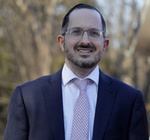
Doni, a friend of mine since high school, sidled up to me in the supermarket one day and said he wanted to talk. He related that years ago he had been visiting Israel and saw a man outside Yericho who was giving camel rides. He approached the man and asked, “How much do you charge to go up on the camel?” The man replied good-naturedly, “It is free.” The price was right, so Doni took a deep breath and courageously proceeded to participate in local culture. He mounted the camel, and the camel rose. Led by its owner, the camel began to walk, as Doni held on tightly with a mixture of joy and trepidation. Eventually he had enough and decided it was time to come down. He called to the owner that he wanted to stop. The owner called back, “To go up on the camel is free, but to come down is 20 shekel? Okay?” Doni didn’t find it funny, but he did agree.
Now, years later, standing in the supermarket, hearing the story from Doni, I thought the story was funny. But I saw that Doni looked quite serious, and I realized that the story was just the mashal (parable). I waited, and Doni continued. “I thought of that incident recently after I met with my lawyer about getting divorced. You see, to get into the marriage was relatively free. Our parents paid for the clothes, the wedding, and the furniture to set us up. But now that I am trying to get down, it is getting very expensive.”
Doni proceeded to describe the weekly therapy costs for each of his three children. Besides the financial costs, the emotional toll was also significant. Proceeding with divorce felt like the breakup of everything he lived for and built with his wife for 15 years. He knew in his heart that all the therapy in the world still wouldn’t make things right after the divorce.
Then there was the financial complexity of breaking up the home and assets, and trying to figure out how, moving forward, they would stretch their respective incomes to support two homes instead of one. The entire experience was heartbreaking. I just stood, absorbed, and bonded with Doni as he described his pain.
Divorce exists. When appropriate, it provides a mechanism that allows for the separation of husband and wife. Sometimes that is the wise choice; it allows each party to move on to a brighter future. Marriage is about love, unity, and understanding. Marriage is not meant to shackle anyone.
Yet standing in the supermarket together, Doni was asking me if there was the possibility of a second chance. Getting off the train of marriage was too costly, financially and emotionally. Was there another option? Was there a system that could help him and his wife rebuild their marriage? In fact, he wondered, “Maybe the term ‘rebuild’ our marriage is not entirely accurate. Maybe we never really built our marriage to begin with. I mean,” he continued, “we did the marriage thing. We hung out with young couples and had children. But we never really built our marriage.”
Indeed, many couples face challenges in their relationship. In some cases, there is something particular that concerns them. In other cases, simple burnout seems to be the challenge. Having worked with couples for many years, and having mediated for couples after the dreaded “D” word was used, I have found that certain styles in relationship and specific techniques can make a huge difference for couples who want to rejuvenate their marriage.
My goal and experience in working with couples is not simply to preserve the marriage. I do not find it satisfying to simply band-aid problems and do the proverbial kick-the-can-down-the-road trick. I yearn to help couples reach good communication, understanding, and problem solving together. Using the model of mediation, which is largely focused on effective communication, we strive for genuine harmony between husband and wife, often to a level of pleasantness that many never thought possible.
Here are five steps that any married couple can try on their own or with a mentor, therapist, or mediator.
Step 1: Communication. Each of you gets the opportunity to say your story. Whether you are dealing with communication issues or relationship issues, this process can pave the way for healthy dialogue and a loving relationship. Dr. Meir Wikler, in his book Ten minutes a Day to a Better Marriage, encourages couples to designate 10 minutes to truly share thoughts and feelings by taking turns. You can give this process structure by buying a sand timer for this purpose. This step requires some degree of optimism, which is sometimes dormant. One of my favorite books relating to this stage is Richard Carlson’s You Can Feel Good Again.
Step 2: Change. A useful exercise is inviting husband and wife to each share three things that they would like the spouse to adjust or improve in. Additionally, husband and wife should each offer two things that they would like to do to improve the marriage.
The five items that each person identifies can be a springboard for discussion regarding what is important to each of you. The best is to start with one small step of improvement in each area. Little steps change the direction of the marriage and breathe hope into the relationship. Often, couples are great at identifying the five items of change but are at a loss in breaking down the items to very small, meaningful baby steps. A session with a coach, mentor, or mediator can be quite helpful in identifying a small meaningful step that each of you would be comfortable being answerable for. One of my favorite books relating to this stage is James Clear’s Atomic Habits.
Step 3: What is your love language? Sometimes couples want to be devoted to each other but feel terribly disconnected. In this step, it is important to explore what fills your love tank and what depletes it. You and your spouse will have an opportunity to understand your relationship and love communications languages. It is important to realize that differences in values and relationship languages are not a problem. Differences are fine. Couples must simply be aware so that they can express love in a language in which their spouse will feel the intended support.
There are many love languages including, giving and receiving gifts, acts of service, words of affirmation, spending quality time, sharing and valuing intellectual insight, and physical touch. Couples need not be perfect in all areas to repair a marriage. But awareness enables couples to focus on what is meaningful and helpful in their relationship. One of the most popular books on this topic is Gary Chapman’s The Five Love Languages.
Step 4: The art of loving conversations: When husbands and wives deal with difficult situations, they will often slip into doses of contempt and defensiveness. I describe this as “the courtroom,” in which each tries to prove their worthiness and the worthiness of their position. One of the principles that I try to stress is that we should accept each person as worthy and accept each person’s position and opinion as valuable. The goal of loving conversation is not to prove your point but, rather, to share it as a means to build understanding and relationship. Simple changes in technique and presentation can help your spouse hear your concerns and enable you both to stay in problem-solving mode and on the same team. As people gain expertise in this area, they often find that difficult conversations can actually be endearing (with a touch of humor) as they get to act as best friends with real caring and consideration. Both husband and wife realize that their love is greater than the issue at hand, and they can resolve issues together. One of my favorite books relating to this step is John Gottman’s The Seven Principles for Making Marriage Work.
Step 5: The Path Forward: Conversations are the key to resolving issues and building a loving home. When you and your spouse develop the mutual ability to talk things through, you have the keys to happiness and serenity. This step is about recognizing what it takes to feel secure and safe in the relationship so that you can regularly have open conversation with your spouse. There is an art to “leaning in” instead of “leaning out” when you have a concern in the relationship. One of my favorite books relating to this stage is Crucial Conversations (Patterson, Greeny, McMillain, Switzler).
Marriage is not something to take for granted. It is a precious experience and a relationship to treasure. Sometimes challenges can be overcome with a bit of effort. Other times, a process – and even collaboration of professionals – is required. Care should be taken, when necessary, to build a team that cares for you and that can help you restore a happy and nurturing marriage.
Mordechai Rhine is a certified mediator who specializes in marriage mediation. He is based in Baltimore, Maryland, and services clients throughout the United States via Zoom. Rabbi Rhine has served as a community Rabbi for over two decades. He can be reached through his website, www.care-mediation.com, or by email at RMRhine@gmail.com.
 Previous
Previous

